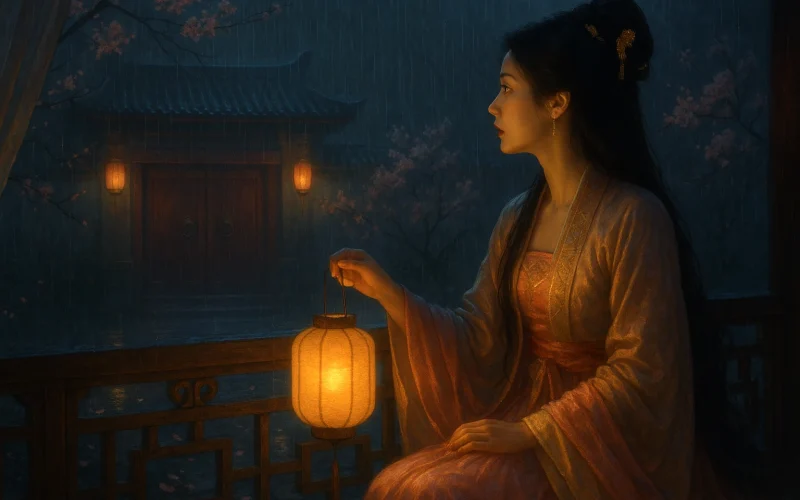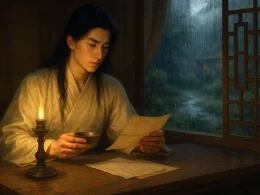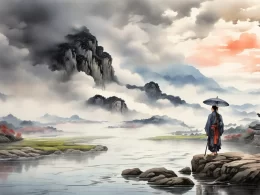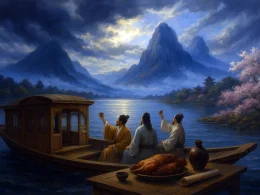Red gates locked—gold chains cold,
Moonlight threads silk panes with petals old.
Candle’s wax congeals in grief,
Plum blossoms frost the night so brief.
Hairpins freeze like jade phoenixes still,
Dreams stretch o’er screens of vanished thrill.
Love’s storm is spent, its passion shed,
Yet spring grass stirs where tears were shed.
Original Poem
「菩萨蛮 · 沉沉朱户横金锁」
冯延巳
沉沉朱户横金锁,纱窗月影随花过。
烛泪欲阑干,落梅生晚寒。
宝钗横翠凤,千里香屏梦。
云雨已荒凉,江南春草长。
Interpretation
This work stands as one of Feng Yansi's most representative compositions, capturing a woman's solitary reverie during a spring night in her chamber. Characterized by exquisite delicacy and profound feminine sensibility, the poem exemplifies Feng's signature focus on romantic longing amidst the turmoil of the Five Dynasties period. Its tightly constructed nocturnal setting—a locked chamber, moonlit solitude—epitomizes the restrained aesthetic of the wanyue (graceful and restrained) poetic tradition.
First Stanza: "沉沉朱户横金锁,纱窗月影随花过。"
Chén chén zhū hù héng jīn suǒ, shā chuāng yuè yǐng suí huā guò.
Vermilion doors, heavy and silent, barred with golden locks,
Moonlight filters through gauze windows, tracing blossoms' sway.
These opening lines establish an atmosphere of profound stillness. The "vermilion doors barred with golden locks" symbolize both physical seclusion and emotional isolation, imprisoning the woman in her solitude. The delicate movement of moonlight tracing blossoms' shadows ("随花过") creates a mesmerizing visual rhythm, simultaneously suggesting time's silent passage and the woman's protracted gaze—a gaze steeped in unspoken yearning.
"烛泪欲阑干,落梅生晚寒。"
Zhú lèi yù lán gān, luò méi shēng wǎn hán.
Candle wax pools, nearing exhaustion,
Fallen plum blossoms summon evening's chill.
The "candle tears" (烛泪), a classic metaphor in boudoir laments, embody the woman's endless weeping and emotional depletion. "Fallen plum blossoms" (落梅), drifting in late spring, symbolize both fading youth and scattered love, while "evening's chill" (晚寒) conveys not just seasonal coolness but the protagonist's inner desolation.
Second Stanza: "宝钗横翠凤,千里香屏梦。"
Bǎo chāi héng cuì fèng, qiān lǐ xiāng píng mèng.
Her jade hairpin, adorned with kingfisher-feathered phoenix, lies askew,
Beyond the fragrant screen, her dream traverses a thousand miles.
The disheveled "jade hairpin" (宝钗) vividly captures the woman's recumbent posture, its displacement mirroring her emotional disarray. The "fragrant screen dream" (香屏梦) transports her spirit across vast distances—a fantasy of reunion that underscores her obsessive devotion to past affections.
"云雨已荒凉,江南春草长。"
Yún yǔ yǐ huāng liáng, jiāng nán chūn cǎo zhǎng.
Passion's clouds and rain now lie desolate,
While by southern rivers, spring grasses endlessly renew.
The allusion to "clouds and rain" (云雨), the ancient metaphor for lovers' intimacy, rendered "desolate" (荒凉), creates a heartbreaking contrast between past ardor and present emptiness. The final image of "southern grasses endlessly renewing" (春草长) transforms the landscape into a living testament to her unceasing sorrow—where nature's cyclical rebirth underscores love's irretrievable loss, leaving the poem's resonance to linger like an unanswerable lament.
Holistic Appreciation
This ci poem adopts the soliloquy of a young woman in her boudoir, weaving together imagery of night, candlelight, flower shadows, dreams, fallen plum blossoms, and spring grass to layer the emotions of longing and solitude. The setting is confined to a single spring night within the deep chambers of her home, with emotions escalating from gazing at the moon in yearning, to a dreamlike reunion, then awakening to despair, and finally sinking into the endless sorrow of spring grass.
The poem excels in blending movement and stillness—phrases like "the moon's shadow follows the flowers" and "the dream soul drifts a thousand miles" mirror the woman's fluctuating emotions. At the same time, it achieves a seamless fusion of scene and sentiment, embedding inner feelings within tangible objects, reaching an artistic realm where "the words are simple, but the meaning is profound, and the scenery conceals emotion."
Artistic Merits
- Exquisite Imagery, Intense Emotion
Symbols like "candle tears," "fallen plum blossoms," and "spring grass" are classic emotional carriers in lyrical ci poetry, rich in symbolic meaning. - Clear Progression, Graceful Rhythm
The transition from gazing, to dreaming, to awakening unfolds naturally, forming a complete psychological arc. - Subtle Language, Polished and Elegant
The lines are neatly balanced, with refined yet unpretentious diction, conveying emotions with natural sincerity. - Emotion Embedded in Scenery, Blending Reality and Illusion
The interplay of flower shadows, moonlight, incense screens, and spring grass merges the real and the imagined, deepening the poem's lingering, implicit charm.
Insights
This ci profoundly depicts a woman's loneliness and lingering attachment after emotional loss, revealing how people, in the wake of heartbreak, repeatedly immerse themselves in memories and fantasies. It reminds us that the most moving aspect of true emotion is not the passion of love, but the tenderness and longing that persist even in solitude. Feng Yansi’s delicate portrayal of a woman’s sorrow and waiting grants this short ci a timeless power of resonance.
About the Poet
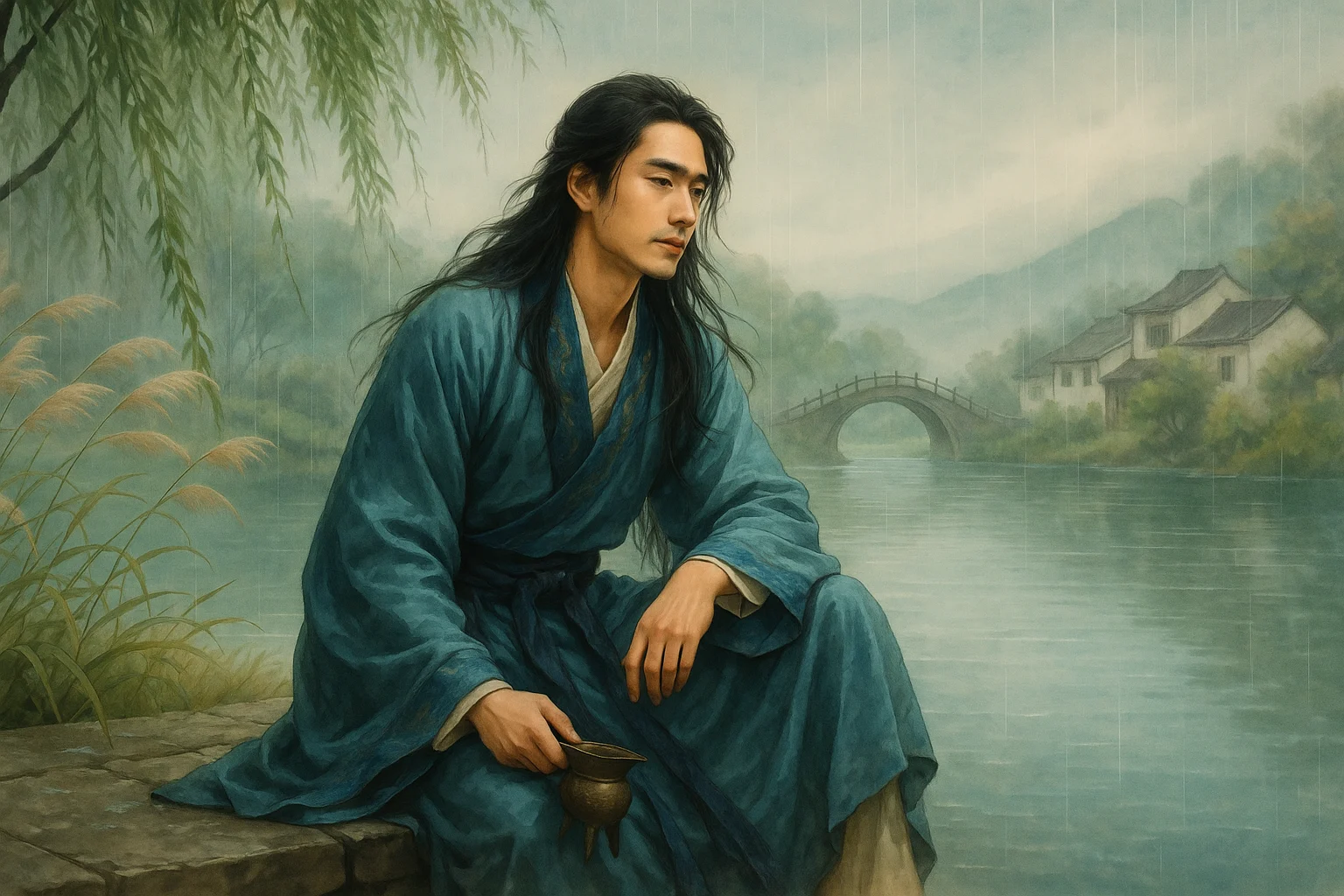
Feng Yansi (冯延巳 903 - 960), courtesy name Zhengzhong, was a native of Guangling (modern-day Yangzhou, Jiangsu) and a renowned ci poet of the Southern Tang during the Five Dynasties and Ten Kingdoms period. Rising to the position of Left Vice Director of the Department of State Affairs (Zuo Puye Tongping Zhangshi), he enjoyed the deep trust of Emperor Li Jing. His ci poetry forged a new path beyond the Huajian tradition, directly influencing later masters like Yan Shu and Ouyang Xiu, playing a pivotal role in the transition of ci from "entertainment for musicians" to "literary expression of scholar-officials."






